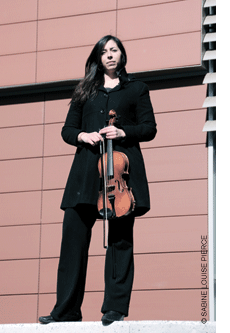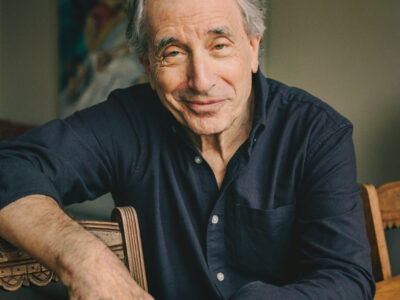
It’s a speakeasy ambiancetonight at Moonstone Arts Center, atop the old Robins Bookstore in Center City Philadelphia. Patrons enter from the side door, then climb a narrow flight of stairs to a dark room where the crowd sits cheek-to-jowl at long tables or in rows of folding chairs facing the stage. Some are drinking carried-in beer and red wine from paper cups; all are fixated on the music. But this is no jazz club or indie folk show. The band is playing Bach tonight. The Orchestral Suite No. 2 in B minor, to be precise.
Welcome to the Philadelphia chapter of Classical Revolution, an underground movement from San Francisco that is popping up in cities throughout the US and Canada. The mission is to offer chamber music in comfortable, non-threatening venues—bars, cafés, clubs, and bookstores. Concerts are informal, a far cry from your usual suit-and-tie recital at the Kimmel Center.
Classical Revolution fosters collaborations between local musicians from mixed styles and backgrounds. Tonight’s players are a cross section of the Philadelphia classical-music world: a high-school kid, a professional flutist, a couple of recent Oberlin conservatory grads, a rock-band cellist, a heavily tattooed fifty-something member of the Philadelphia Orchestra, and two Penn notables. One is Tim Ribchester Gr’12 [“Arts,” Sep|Oct 2008], a lecturer in the critical-writing program, who is playing continuo on an upright piano painted turquoise. The other, sitting in on second violin, is Veronica Jurkiewicz C’04, a music-department administrator and co-founder of the Philadelphia chapter of Classical Revolution.
Jurkiewicz, who pronounces her last name yer-KEV-ich, joined Classical Revolution in its early days, during her three-year stint at the San Francisco Conservatory, where she earned her master’s degree and artist’s diploma in viola performance. When she returned to Philadelphia three years ago, Jurkiewicz and a few musician friends from the San Francisco movement and its Chicago offshoot got together to start a Philadelphia branch, which stages concerts—irregular, but frequent—in casual venues throughout the city.
A revolutionary by night, Jurkiewicz is by day the picture of serenity, with a soft voice and unflappable demeanor amidst the hubbub of her ground-floor office in the freshly renovated Music Building on 34th Street. As coordinator of the music department’s performance program, she works with faculty, staff, and students to maintain its complicated performance roster of 10 department-sponsored student groups. In addition, she administers the department’s other performance activities, such as the Blutt College House Music Program, which provides lessons and ensemble coaching for Penn students. Switching hats in the late afternoon, Jurkiewicz gives viola lessons to Penn students through the Blutt program, and violin lessons to students ages 4 to 55 at Philadelphia’s Settlement Music School. She also maintains an active performance life, freelancing with professional orchestras such as Philly Pops.
Equal parts innovator, administrator, practitioner, and teacher, Jurkiewicz is the model of a 21st-century working musician: a multi-tasker who integrates her skills in a centuries-old musical discipline with managerial and new-media know-how. She is also a product of, and poster child for, Penn’s music- performance program.
Like her mother Mercedes Nu’78, a nurse who plays cello in the Allentown Symphony, Jurkiewicz came to Penn as an undergrad with a keen academic interest in the sciences. She expected to play violin on the side while pursuing her major in the biological basis of behavior. Having grown up in a musical household—her late father, Andrzej, was an opera conductor, and her mother started all five Jurkiewicz kids on Suzuki lessons as preschoolers—she studied violin seriously throughout her high-school years in Emmaus, a small town in Pennsylvania’s Lehigh Valley. Yet she was never on the pre-conservatory track—her interests were in cognitive neuroscience.
As a Penn freshman, Jurkiewicz joined a fledgling student-run chamber-music club, where she played violin in a couple of ensembles. The following year, the music department brought in violist David Yang C’89 GAr’92 [“Alumni Profiles,” May|Jun 2004] to coach this small but rapidly expanding group of student musicians, and the Penn Chamber Music Program—the program Jurkiewicz now administers—was born.
Perhaps it was fate, or perhaps it was a calculated move when Yang lent Jurkiewicz a viola to fill in a quartet. Yang, the founder of the Philadelphia Viola Society and multiple chamber-music series and initiatives, is renowned for his ability to inspire students—a sort of pied piper of chamber music. That semester he found himself short of violists, a familiar problem in chamber-music circles since the viola, whose inner voice is integral to that genre’s sound, is less frequently studied by young musicians than its flashy cousins, the violin and cello. Jurkiewicz fell in love with the alto voice and timbre of her borrowed viola, and with its role in musical ensemble. She had what chamber musicians refer to as a “viola personality”—an instinct to merge with and hold together the web of sound. Soon she declared a second major, in music, and began to transition to full-fledged violist.
“The BBB major remained important to me, because I’m interested in the connection between music and the brain,” said Jurkiewicz recently over coffee at a campus Starbucks, a few blocks from the busy music building. “But the music major was pure pleasure—it never felt like work. I loved learning viola. My applied-music classes were fun. Writing papers for music class was fun. I loved the professors, and all of my closest friends were through the music program. Which showed me that I knew in my heart what I really wanted to do.”
Self-taught at first, Jurkiewicz began studying viola formally with Daniela Pierson C’92 through the College House Music Program she now administers. By the time she graduated, she was ready to audition for Masters of Music performance programs, using an instrument borrowed from Pierson and competing against graduates of Juilliard, Curtis, and other major conservatories. (She is still getting by with borrowed violas.) Jurkiewicz chose San Francisco for its outstanding chamber-music program, and the rest—including her involvement with Classical Revolution—is history.
Jurkiewicz now works with and beside Yang, her Penn mentor, in whose footsteps she followed as an instrumentalist, teacher, and innovator.
“The teacher-student relationship in music-performance studies is more interactive and more personal than in most academic scenarios,” says Yang, who also coached Jurkiewicz’s sister Julia Nu’08, a cellist and nurse, now living in San Francisco and active in the original Classical Revolution chapter. “Many of my Penn students are with me, in small ensemble classes, for their entire undergraduate careers. It’s incredibly gratifying watching a student you know so well grow up and mature into an adult. And Veronica was always a favorite. She’s a wonderful musician; she lives for music, and she understands so well the students’ point of view.”
And now, he adds, “it’s delightful to have her as a colleague.”
—Karen Rile C’80




